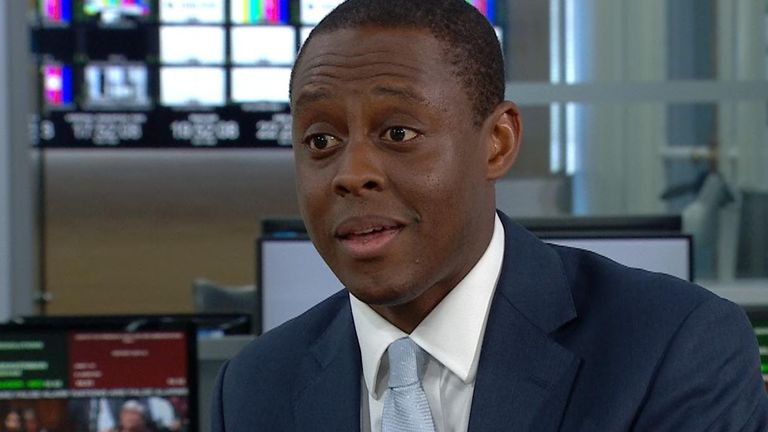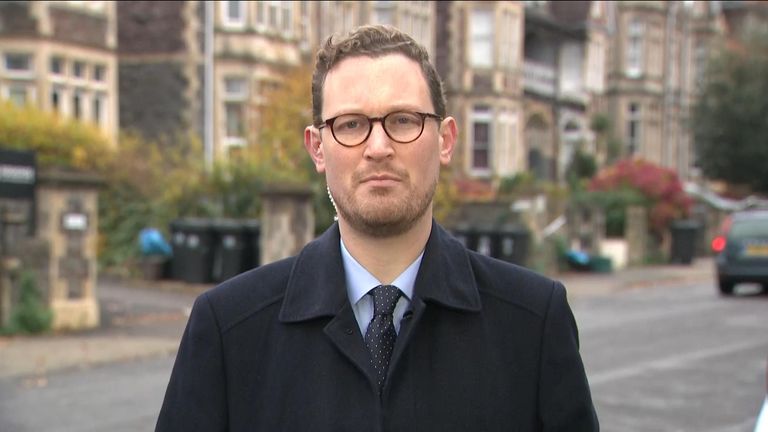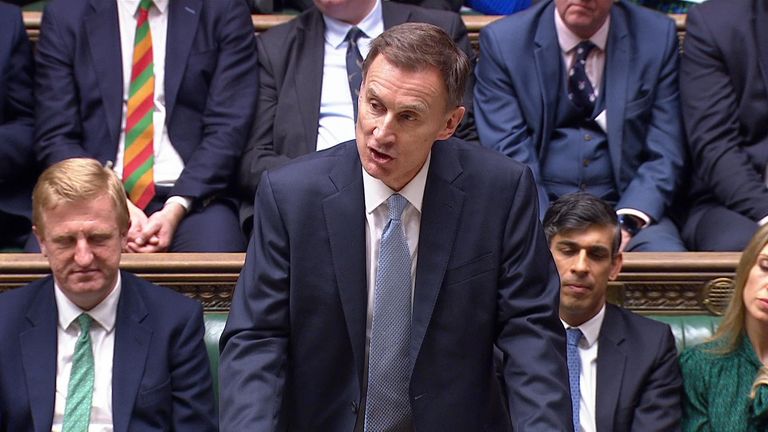Tory plan to abolish national insurance ‘will cost more than Liz Truss mini-budget’ – Labour

[ad_1]
Labour is demanding the Tories spell out how they will pay for a “reckless” plan to abolish national insurance contributions.
Chancellor Jeremy Hunt said in his budget it was his long-term ambition to “end this unfairness”, while an email sent to Tory members said “we’ll be able to make progress towards that goal in the next parliament”.
Politics Live: Braverman joins Tory critics of budget announcements
Treasury minister Bim Afolami also confirmed the plan to Sky News on Wednesday, telling the Politics Hub with Sophy Ridge: “We want to eliminate that double tax on work.”
Labour said the move would cost £46bn a year, equivalent to £230bn over the course of a five-year parliament, and questioned how the Tories plan to pay for it.
They said that is a larger pledge than the £45bn package of unfunded tax cuts announced in the infamous Liz Truss mini-budget which unleashed economic chaos and upended her premiership.
Darren Jones, the shadow chief secretary to the Treasury, said: “If the Tories are going to make promises to the electorate, they should say how they’re being funded.
“Mortgage holders across the country know only too well the consequences of pie in the sky, unfunded Tory promises on tax cuts. But today’s budget reveals Rishi Sunak is in hock to the reckless voices who want to re-run the Liz Truss experiment.”
He added: “Labour will never play fast and loose with the nation’s finances. It’s time for change. It’s time for a general election.”
In his spring budget on Wednesday, Mr Hunt announced a further 2p cut to national insurance, having already slashed it by this amount in the autumn statement.
Taken together it means the average worker will save around £900 a year.
However, the overall tax burden will still reach a record high by the end of the decade because of freezes on tax thresholds dragging people into higher tax brackets.
Mr Hunt signalled he wanted to go further on the reduction to national insurance in the future, calling it a “double taxation” because it is taken from payslips on top of income tax.
In his budget statement, he said: “Because Conservatives believe that making work pay is of the most fundamental importance, because we believe that the double taxation of work is unfair, our long-term ambition is to end this unfairness.
“When it is responsible, when it can be achieved without increasing borrowing and when it can be delivered without compromising high-quality public services, we will continue to cut national insurance as we have done today so we truly make work pay.”
Speaking later to Sky News, Treasury minister Mr Afolami said the plan “isn’t just some ideological thing” and it would “help grow the economy”.
Read More:
Budget 2024: The main points
Why calling this a ‘tax-cutting’ budget is not entirely accurate
The pledge may help placate Tory MPs who wanted the government to go further in the budget and cut income tax to give them a fighting chance at the next election.
Former Home Secretary Suella Braverman told Sky News the party is in a “dire position” in the polls with “very good MPs” likely to lose their seats – as she criticised the budget for “lacking something vivid”.
As well as confirming a 2p cut to NI, Mr Hunt announced the current system for non-dom tax status will be abolished, the freeze on fuel duty will be extended and the child benefit threshold will be raised.
Labour, which is planning to unveil posters accusing the government of a “betrayal” on Thursday, said families will still be £870 worse off despite the measures.
Click to subscribe to the Sky News Daily wherever you get your podcasts
Shadow chancellor Rachel Reeves said: “For every extra £10 people are paying in tax they are only getting £5 back and the average household will still be £870 worse off under Rishi Sunak’s tax plan.
“It’s just a cynical gimmick from a weak prime minister who is desperately trying to cling onto power.”
The lack of giveaways in the budget has cooled speculation of a May election.
Mr Hunt told Sky News the budget was “absolutely not” the last throw of the dice before the country goes to the polls, and did not rule out another fiscal event before then.
Asked if Downing Street is working towards an autumn election, and potentially another fiscal event, he said: “That’s the working assumption. But in the end, it’s a choice the prime minister makes.”
[ad_2]


